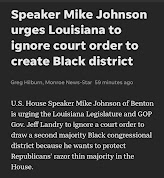@Japapathway
Even in the redistricting of Louisiana Congressional districts the truth comes out.
You all can forget it. "A new generation is here"
The mainstream defunctory methods to rid the nation, of others' former ideas to do with continued 19th century practices is undone.
Locally, statewide & nationally a move is on to destroy public education. In Louisiana, the governor and his super-majority legislature, is using 'public money' to pay for tuitions in 'private schools'.
Governor Jeff Landry has declared this state is a maga state.
The giant social-media company META, is announced it's $10 billion dollar facility, to be built in Northeast Louisiana's Holly Ridge in Richland Parish.
Director, Data Center Infrastructure at Meta | former Apple & Cisco
In the mean while, state and local initiatives are affecting individuals and families in different ways. In other words, the ultra-neoconservative actions are "trickling down" incessantly. For instance the prominent, Monroe City School System's Neville High School has filed papers to become a Charter School. Why?
What ignored need will Neville Charter school address?
The dedication of parents and community members to improving educational outcomes at Neville High School is commendable. The Neville Charter Association’s stated goal of moving from “good to better” reflects an admirable commitment to excellence that has long been part of Neville’s tradition. However, the proposal to convert Neville to charter status raises serious questions that deserve careful scrutiny.
The most glaring issue is the fundamental question of necessity. If the Monroe City School Board has not rejected any academic program changes requested by Neville High School, what additional benefits would charter status provide that couldn’t be achieved within the current system?
The NCA’s application, while robust in its aspirations, is notably thin on specific academic interventions that aren’t already available to the school.
Of particular concern is the application’s failure to address one of Neville’s most pressing challenges: the growing achievement gap affecting its minority student population. Recent data shows alarming underperformance in core subject areas among minority students. The charter proposal offers no concrete strategies to tackle these disparities beyond what the school could implement without being a charter.
Everything the NCA wants to do academically as a charter, can be done now, except dealing with the growing presence of underperforming minority students. Neville, once an all white school is now mostly minorities, 54% of whom are African-Americans.
Under charter status, students from predominantly minority areas like Parkview and Robinson Place would have the option to attend Neville but wouldn’t be zoned or required to do so. This arrangement has rightfully raised red flags among minority community leaders who question whether the charter conversion might become a vehicle for demographic cheerypicking to weed out undesirables and send them to Carroll or Wossman.
Any principal would love to have a school without students who are frequently absent, disruptive, and score low on ACT and state assessments. That can only be achieved in private or a specialized “college-bound” charter school that has the freedom to cherry pick students.
It’s a suspicion. The NCA has not made any indication that it has anything but honorable intentions, but the suspicion is a reality in the Black community.
The NCA’s board must address these concerns head-on. Their vision of moving from good to better is laudable, but it must be achievable for all students, not by eliminating rather than helping its underperforming students.
Before supporting such a significant change in governance, we must ask: What specific academic programs would charter status enable that the current system prevents? How will the NCA ensure that achievement gaps between the races are closed rather than widened? How will the underperforming racial minorities in the school be helped to become “college bound” as a result of the charter status.
The desire to improve is right, but the means matter.
If Neville’s leadership has ideas for academic improvement, they should present them to the school board. If those ideas are rejected, then charter conversion might be worth discussing. But until that happens, the rush to charter status seems like a solution in search of a problem – one that could create new challenges while failing to address existing ones.
%201st%20ES%202024%20-%20Congressional%20Districts%20-%20Ouachita.pdf.png)












No comments:
Post a Comment